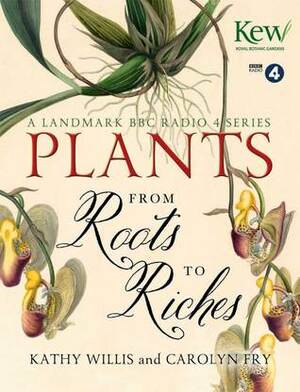
Plants: From Roots to Riches
by Kathy Willis, Carolyn Fry
Genres: History, Non-fiction, SciencePages: 368
Rating:

Synopsis:Our obsession with plants and gardening goes back a long way and Plants: From Roots to Riches takes us to where it all began. Taking a journey through the scientific life of a uniquely British institution across 25 vivid chapters, this book explores how the last 250 years have transformed our relationship with plants for good.
Based on Radio 4’s landmark series, Kathy Willis, Director of Science at the Royal Botanic Gardens, Kew, and Carolyn Fry, the acclaimed science writer, will take us from the birth of modern botany right through to the modern day. Delving into Kew’s archive and its world-class collections – including the Herbarium with over 7.5 million preserved plant specimens – they start with Carl Linnaeus and his invention of a universal language to name plants, through Joseph Banks’ exotic discoveries and how Charles Darwin’s fascination with orchids helped convince doubters about evolution. And as the British Empire painted the atlas red, explorers, adventurers and scientists risked their lives to bring the most interesting plant specimens and information back to London, and to Kew. From the lucrative races to control rubber, quinine and coffee to understanding the causes of the potato famine, the science of plants has taught us fascinating and enormously valuable lessons.
Full of amazing images from the archives, (some never reproduced before) and packed with history, science, memorable tales of adventure and discovery, politics and conflict, changing economic and social preoccupations, each chapter tells a unique and fascinating story, but, gathered together, a great picture unfolds, of the development of a most remarkable science, the magic and beauty of plants and ultimately our dependency on them.
Plants: From Roots to Riches is based on a series that was on Radio 4, written by Kathy Willis and Carolyn Fry. I never caught the radio version, but the book version is well-organised into a bunch of pretty bitesize chapters, following the development of botany as a modern science through the lens of Kew Gardens. It has some illustrations, though the colour plates seem quite muted and faded (not sure if this was always so or whether it was the age of the book — it’s a library book).
I don’t think it goes into enormous depth, so if this is your pet topic then likely there isn’t much new for you here, but it was an enjoyable read for me. The focus on Kew and the part Kew has played in the development of botany helped to focus things, and because of the various characters that have been historically involved with Kew, added a bit of human interest too (though none of them seem totally eccentric, alas).
It was a surprisingly fast read, I think because it is basically skimming the surface in a radio-friendly way. I learned some things, but nothing that terribly surprised me.
Rating: 3/5
